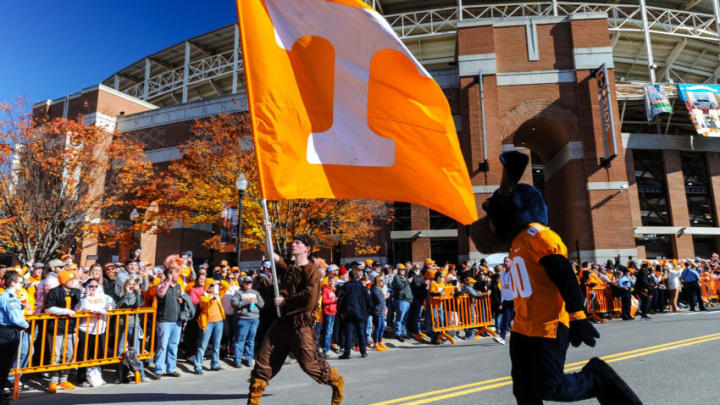The formula for Tennessee football to return to prominence is back. All the Vols have to do is open up the checkbook and become the Los Angeles Dodgers or New York Yankees of the NCAA with the new NIL rulings. That’s exactly what they’re doing.
As Eric Prisbell of On3 reported last week, the Tennessee-centric Spyre Sports is the most ambitious NIL collective in the nation, with the stated goal of spending $25 million on athletes. Combine that with the state of Tennessee having arguably the loosest NIL legislation, the motive is clear.
Based on multiple stories in The Athletic, Tennessee football is winning the recruiting arms race. Five-star quarterback Nico Iamaleava, who committed to UT for 2023, may have earned $8 million worth in NIL deals. The story has sparked concern among rival coaches and athletic directors, including Lane Kiffin. To all of them…cry me a river.
There are legitimate concerns about NIL going forward. Rick Barnes brought up one just last week about agents getting involved and if or how it should be incorporated into recruiting. However, recent concerns aren’t about that. They are about the money a player is getting.
Indeed, the NCAA has addressed this pretty quickly. Ross Dellenger of SI reported that the NCAA has put in new guidelines to stop boosters from recruiting. He tweeted out the news and revealed that schools who have used boosters for egregious deals could be retroactively punished.
News: NCAA Board of Directors adopted NIL guidelines that clarify existing bylaws prohibiting boosters from recruiting, sources tell @SINow.
— Ross Dellenger (@RossDellenger) May 9, 2022
As @SINow reported last week, schools with boosters who have induced prospects thru NIL will be investigated, including past deals.
An article by Abigail Gentrup of Front Office Sports last week noted that a task force is being set up to crack down on NIL collectives. Greg Sankey and other conference commissioners are trying to get Congress involved. However, an article by Dennis Dodd of CBS makes one thing clear: only the amount is concerning rivals.
In that article, the most prominent coach to whine about the NIL deal was Ryan Day of the Ohio State Buckeyes. OSU was not one of the top five schools mentioned that was the center of an NIL collective. The four with the Vols include the Florida Gators, Miami Hurricanes, Texas Longhorns and Oregon Ducks.
Day complained about an arms race trying to lure a player. Meanwhile, an anonymous coach told a story of a mid-major coach being told a player wanted $200,000 or was in the portal, and he criticized that situation. Here’s the problem: That anonymous coach was a Power Five coach.
Throughout that whole article, in fact, not one mid-major or Group of Five official complaining about competitive imbalance was quoted. Why? Well, they already have a competitive disadvantage. NIL money isn’t going to do anything to change that.
Actually, there’s a chance it could offset the competitive disadvantage. Perhaps players will want to play for their local school, which may be a smaller school, with more money to help their families out rather than ride the bench at Ohio State for free for a few years.
Proof of that possibility is Alabama Crimson Tide coach Nick Saban. Last month, Saban called the current state of the sport with NIL rules unsustainable in an interview with AP. His reasoning, again, was the concern of an NIL arms race. Okay? Who cares?
Coaches are the benefactors of arms races all the time. Saban started that with the $8 million Alabama gave him years ago. Also, again, in terms of competitive imbalance, you can’t get more competitive imbalance in favor of Alabama than you’ve had the past 15 years.
Saban has had the No. 1 recruiting class more times than not during his years in Tuscaloosa, Ala., an unprecedented run. He benefits from his own success breeding more success, which happens in college football more than any other sport, along with his school being in area rich in NFL talent with his state along with Florida and Georgia.
Why is the only competitive advantage that’s unacceptable the one that actually allows players to profit off the revenue they generate? Well, the answer to that is clear. Coaches and ADs don’t like the schools that are going to profit most off them, ie. Tennessee football.
Rocky Top smartly got ahead of the curve on this one and is reaping the rewards, the same way they were ahead of the curve with Title IX in the 1970s and reaped the rewards with the Lady Vols basketball program. Identifying trends before they happen is how you become elite.
Recent transfers and success on the recruiting trail gives off the vibe that Josh Heupel is about to help the program return the Vols to prominence again. Texas, Miami, Florida and Oregon have the same advantage now, and there may be smaller schools that compete at a higher level.
That’s what these rival coaches and ADs hate. This sport couldn’t have had less competitive balance even if it tried before NIL deals, so they don’t care about that. They never have. What concerns them is losing their advantage if they can’t keep up with Tennessee football. That level of jealousy is driving any attempt to control the situation.
